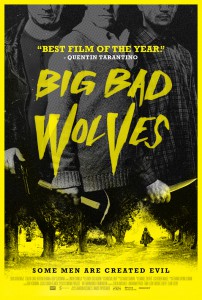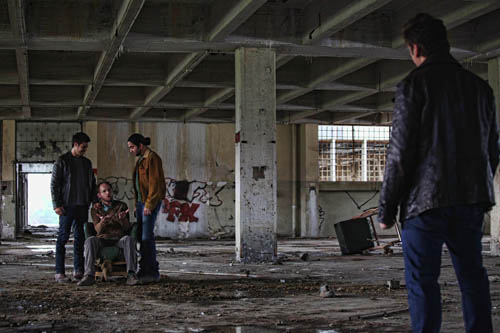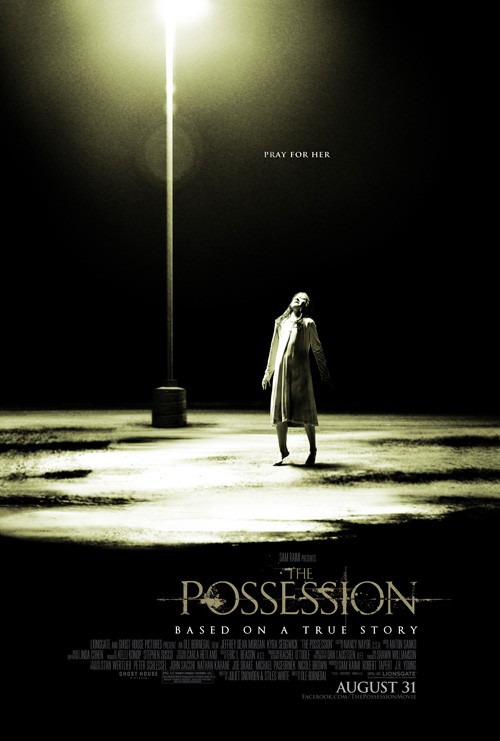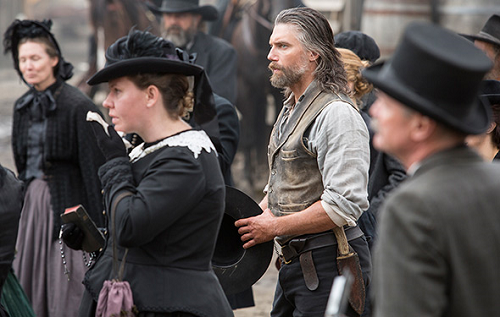Big Bad Wolves 
Written and directed by Aharon Keshales and Navot Papushado
Israel, 2013
Conviction is both an extraordinarily beneficial and destructive quality a person can espouse. One can find an unshakeable energy in conviction to drive them through a sea of challenges and persecution to fight for what they believe is right. On the other end of the spectrum, a person’s staunch conviction can encourage them to employ extreme methods to prove a point in the face of defiance. The writing and directing duo Aharon Keshales and Navot Papushado return for their second effort after 2010’s Rabies with Big Bad Wolves, a film in which various characters’ convictions regarding a murder suspect’s culpability is severely tested.
Meek, innocent-looking schoolteacher Dror (Rotem Keinan) is, in the eyes of his students, their parents, and the police, a pedophile and murderer. Recently, young girls have been abducted, their bodies discovered days later displaying clear signs of sexual harassment and intense physical torture prior to eventual decapitation. Interestingly, the audience is provided no explicit hints as to whether or not Dror is guilty or innocent. Regardless, cop Miki (Lior Ashkenazi) is obsessed with making Dror confess to the crimes and an early attempt at trying to achieve that goal has him temporarily suspended from the force. Little was he aware that another man, Gidi (Tzahi Grad), father of the most recent victim, is even more driven than Miki, having purchased a home in the countryside with the specific intent of getting a confession from the accused, no matter what.
Big Bad Wolves is a rare case where the trailer and the final product are equally excellent. The marketing promised an inexplicably bleak venture into psychological depravity while flirting with some torture porn. In truth, directors Keshales and Papushado eschew that simplistic plan of attack, preferring to study an alarming case of how profound grief born out of great tragedy leads someone to pulling out all the stops to have their convictions confirmed. Lacking any definitive proof regarding Dror’s involvement in the heinous crimes, Miki and Gidi forsake their ethics; both are more than willing to inflict heaps of pain into their suspect just to hear him squeal out the location of one young girl’s head, therefore sealing his fate and confirming what they have already for granted as factual.
In essence, their collective conviction permits them to engage in heinous acts themselves. As already established, the viewer is unaware of any definitive proof linking Dror to the pedophilia spree , yet is invited study the fervor with which Miki and Gidi go about forcing a confession out of him. Dror, in turn, does nothing else other than plead his innocence, proclaiming time and time again that has not the faintest clue where the girl’s head is buried because he never touched her. How badly do the protagonists want to obtain the required information? At what point do Miki and Gidi cease being the protagonists and transform into antagonists? Were they antagonists all along? If Dror is innocent, what they have done is unspeakably awful. If Dror is guilty, have they actually done the right thing? Big Bad Wolves offers a myriad of questions to the audience and never, except in one instance, provides any clear answers. Keshales and Papushado have written and directed what is arguably one of the most morally ambiguous films in recent years. Anchoring the picture are two perfectly calibrated performances from Lior Ashkenazi and Tzahi Grad. Rotem Keinam is serviceable in the role of the victim who quivers and quakes, but the two aforementioned actors own the movie. There is another performance worth highlighting, although it would entail revealing too much.
Apart from the subversive take on the torture porn genre, Big Bad Wolves is wildly entertaining, which is not something one might expect heading into the theatre. For one, the directors avoid forcing the audience into witnessing indescribably painful acts of violence (although there is a fair amount of those), releasing the tension with exquisitely placed comedy. For a movie with such a dark premise, Big Bad Wolves produces big bad laughs. What’s more, all the small elements which, as they happen, add little more than curious details to the story (Dror offering a little girl a birthday cake, Gidi receiving a phone call from his mother at the most inopportune moment) end up as pivotal plot points that legitimately develop the story and enforce the themes. Looking back of the film as a whole, one comes to realize how intricately structured it is, carefully making one seemingly innocuous event bleed into the next.
Keshales and Papushado are back with another cinematic gem. The film is smart, shocking, entertaining, and thought -provoking. The premise will undoubtedly be a turn off for some and understandably so. For those with even an inkling of curiosity as to what this Israeli duo has in store with this sophomore effort, please don’t be so afraid of the big bad wolves.
— Edgar Chaput







